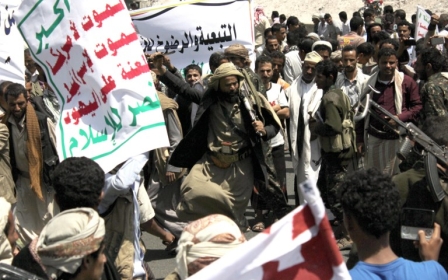'Get a room!' For Yemenis fleeing war, love brings practical benefits
Taiz, Yemen - The wedding of Abdurrahman and Rihab was not lavish by Yemeni standards. The budget was small and the wedding party few in number. But it was a joyful occasion, laced with pragmatism.
The venue was the makeshift refugee camp inside Anas Bin Malik school in rural Taiz, where 170 people from 42 families are crammed into 15 classrooms. The bride, groom and many of the guests were refugees from the war in Taiz city.
For those who have lost everything, the Sunday ceremony was a celebration and another bond fostering a growing sense of community among those stuck in the school in al-Turbah.
But there was also an element of pragmatism. With marriage comes a small improvement in privacy: Abdurrahman and Rihab now have their own room.
Abdurrahman al-Namir arrived with his family at the camp in June 2015, when the war reached their home in al-Jahmalia, Taiz city. By October he had picked up work in the local market and had spotted his new bride.
Stay informed with MEE's newsletters
Sign up to get the latest alerts, insights and analysis, starting with Turkey Unpacked
Rihab al-Sawa, who had herself fled Taiz city, was living in the room next to Abdurrahman in the refugee camp.
"In November, I asked my mother to tell Rihab's mother that I would like to marry Rihab," he told Middle East Eye. "My mother did that, they agreed, and we decided that the wedding would be in February.
'We have to adapt'
"When the residents knew that we would wed inside the camp, they agreed to give me a separated room for me and my wife, and all of them were very happy for the wedding," Abdurrahman said.
Starting a new life in the confines of the camp is not easy, and moving out is next to impossible. Abdurrahman earns $7 a day as a market trader and cannot afford rents in al-Turbah, which have soared due to the influx of refugees from Taiz.
"We have to adapt, and we should not wait for the future to be better, maybe we will not return our houses again, as the war is fierce there. That's why I married inside the camp."
Mohammed al-Sawa, Rihab's father, told MEE that he was glad his daughter had found a suitable husband.
"I live with my brother-in-law's family inside the same room, and he has adults, so I preferred to marry my daughter as it was difficult for her to live inside the same room," he said.
Ayman Abas, the camp supervisor, said he agreed, and decided to offer incentives for other marriages.
"I would not have imagined refugees would think to marry inside the camp, but when I thought about the difficulties the girls face, living with adults in the same room, it seemed the right thing," he told MEE.
"We are willing to provide the future grooms with YR50,000 ($233), we will do small celebration for them, and we will provide them with a separated room."
Abas added: "The displaced people are far from their families, but that does not mean they should not marry until they can return to their houses."
Asem Haroon, 39, a refugee in Anas bin Malik camp, said the wedding created happiness for residents, and that they hoped to see others marry.
"Because of the wedding, I felt that I do not live inside a camp, but in my old neighbourhood in Taiz city," he told MEE. "Many people were happy on that day, even if they used to be sad because of living far from their homes."
Fadhl al-Thobhani, a sociology professor at Taiz University, said there were positive effects to people trying to rebuild their lives - and create new ones - even in such difficult circumstances.
"The refugees have lost hope of returning to their houses in Taiz city, so they have forced to marry inside the camps after more than nine months of living far from their houses, and the marriage will give the girls more privacy."
He said that refugees had started to find alternative work in rural areas, so it was better to marry in order to resume their regular life inside the camps.
"The refugees in the rural areas have not surrendered to life inside the camps, and if they are helped, they have a chance at living more regular lives," he said.
Community in the camps
At another makeshift camp set up in another local school, another wedding took place last week.
Refugees here are Yemenis and Akhdam, a marginalised group in Yemen. Traditional rivalries, however, have taken a back seat to making do as best they can. So much so that many have now gained jobs in al-Turbah market.
Refugee Awn al-Azazi, 35, is one of those with a new job and a new life. "Many refugees work in the market, and we support each other by buying what we need from other refugee stallholders," he told MEE. "We behave as one family."
Azazi worked as a waiter in Taiz before his restaurant closed in May 2015 and he found himself forced to flee the city because of war.
In al-Turbah another refugee who owns a cafeteria helped him get work, and he can now earn about $5 a day.
He added: "One refugee helped me work, and I have now been able to get another refugee work. We have to live as one family in the camp."
Middle East Eye delivers independent and unrivalled coverage and analysis of the Middle East, North Africa and beyond. To learn more about republishing this content and the associated fees, please fill out this form. More about MEE can be found here.





